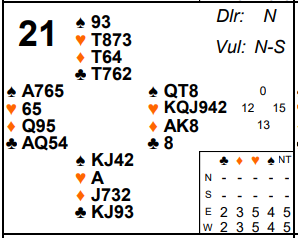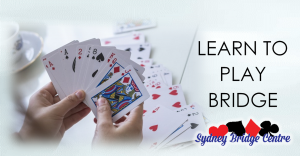City and Canada Bay – Monday Morning 30th September 2024.

Board 21 saw most East West pairs playing in 4♥ and most made it. But on a normal auction they will probably have passed up an enormous opportunity!
The normal auction will start P 1♥ x and now it’s up to West. What would you bid?
These days a lot of people ignore doubles so West might well have just bid 1♠. Now the auction is likely to continue uncontested with something like 2♥ 4♥ or 2♥ 3♣ 3♠ 4♥. East’s 2♥ rebid should show 6 hearts in this sequence so West can raise straight to 4♥. Why does it show 6? Because he doesn’t have 4 spades (he would have raised) or a 4 card minor (he would have rebid it). Nor is he 5332 (he would have rebid 1NT). Now try to find a hand shape for East that doesn’t include 6 hearts! Note that logic is only true after 1♥ – 1♠. After something like 1♥ – 2♣ a 2♥ rebid might sometimes have to be done on only a 5 card suit – imagine if East was a 4531 shape and a minimum hand. He is not strong enough to rebid 2♠ as that’s a reverse which would force his partner to go to the 3 level to return to his first suit.
But here West has a far better bid available to him over the double – redouble! This is traditionally played as a hand that’s about 10+ points, no direct fit for partner, and interest in penalising the opponents. Doubles thereafter are penalty (see advanced section for more). The West hand is perfect for this – what’s more the vulnerability is very attractive for trying to take a penalty. He knows his side is very close to game so they definitely have a big majority of the points. Hence there must be a good chance of taking the opponents 2 off in something doubled for +500 which would beat any non-vulnerable game contract his side could make.
Now switch to poor North. What is he meant to do after 1♥ X XX to him?! His only real option is to bid 2♣ which is what he would have had to bid over partner’s double had West passed. But, as we’ll see in a moment when we look at the play, carnage ensues – the auction should then continue P P X and North South have nowhere else to go. East should usually either double or pass when North bids something in these auctions – pass leaves partner the chance to penalise if that’s what he wanted to do (see advanced section for more).
You might think that North should just pass over the redouble. Maybe. But that will now return to South. What’s he meant to do? If he runs to 1♠ West can double that and it’s also carnage. What is really important is for North South to agree what a pass by North over the redouble means. Does it mean he has nothing and South needs to try and get himself out of the mess himself?! Or does it actually mean he is prepared to play in 1♥ xx – i.e. he has some hearts himself and thinks it could well go off?
It looks like one pair in the City had an accident – because 1♥ redoubled became the final contract! North must have passed and South thought that meant he was happy to play there and left it in – for an unusual score of -920 (1♥ redoubled with 2 over tricks!)
In fact North’s pass should mean he is prepared to play in 1♥ redoubled (how else could he bid a hand that thinks 1♥ will go off)? So, even though it may seem counter intuitive, he should bid with a weak hand.
What about the play? Although no-one played it, consider how it might go in 2♣ x by North. It’s utter devastation! Best defence probably holds declarer to 2 trumps, ♥A and 1 spade for 4 off and -1100 – and it could be worse! 1♠ x by South is equally revolting. Either way East West are scoring massively more than they had available in 4♥ or 3NT. Redouble can be a very powerful weapon and on this hand it would really pay dividends as North South get into massive trouble – even though South’s takeout double of 1♥ is perfectly normal. Question – if East were on lead against 2♣ x – what should he lead and why? See advanced section for the answer.
The more common contract was 4♥ by East and that should make. After the double from South, almost all the points are going to be there so the club finesse is almost marked and provides a discard for one spade loser. So declarer should end up losing 1 spade and probably 2 trumps. He could, if he guessed perfectly, play a heart to the 9 and only lose 1 trump – but that would be pretty double dummy. South would still have a perfectly normal takeout double with a holding of ♥A10 and now a heart to the 9 looks very silly!
Key points to note
- If you know it’s your side’s hand and they wade in with a takeout double, don’t be afraid to redouble – it can lead to some enormous penalties!
- After a redouble it’s critical to agree with your partner what pass means – prepared to play there or wanting partner to run themselves? (It should be the former).
- If partner has redoubled expressing interest in a penalty only bid in front of him with a weak distributional hand that would not have stood a penalty double.
- If you are defending a low level doubled contract where your side has a big majority of the points you should almost always lead trumps – regardless of what other great holdings you might have.
More advanced
After 1A X XX it’s normal to play penalty doubles by either partner. There are, however, pairs who continue to play takeout doubles even after that start to the auction. That’s playable provided the person short in the suit the opponents try to run to remembers to double in case his partner wants to penalise in that suit. Assuming 4th hand does bid something then opener should normally either double it for penalties or pass to give partner the chance to penalise. The only time he should NOT do that and should bid a suit is if he was not prepared to stand a penalty double from partner – e.g. if he has opened light and has extra shape and very little defence or something.
What should East lead against 2♣ x? You might think either ♥K or ♦A are easy leads. Against most auctions they would be – but not this one! East should lead his trump. When partner doubles 2♣ he is basically saying he thinks we have the majority of the values and he has trump tricks. So the only way the opponents are going to score any extra tricks is by ruffing – hence trump leads will reduce that. Here it’s devastating. West can immediately play ♣Q, ♣A and a 3rd round. The best declarer can do is win in hand, lead a spade up and guess right (which is itself not that likely – East opened the bidding so declarer might well play him for ♠A not ♠Q). Once West wins ♠A he plays a 4th round of trumps which removes them all. Now the only tricks declarer can make are the ♥A and one spade. -1100 if he guesses spades right and -1400 if he guesses them wrong!
Julian Foster (many times NSW representative) ♣♦♥♠




